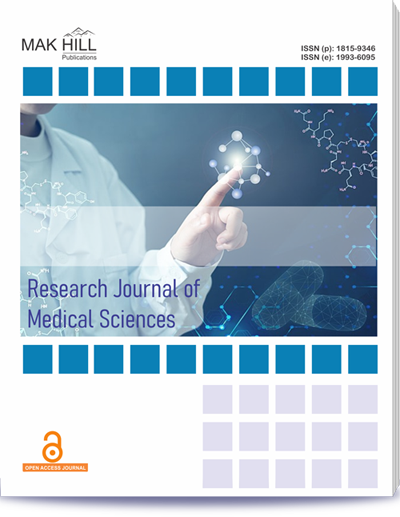
Research Journal of Medical Sciences
ISSN: Online 1993-6095ISSN: Print 1815-9346
134
Views
14
Downloads
A Study on Serum Magnesium Levels and their Association with Glycemic Status in Patients with Type 2 Diabetes Mellitus An Observational study
Gurindapalli Jyothi Swarna Laya Latha, Sandeesha Veeranki and Aruna Yarasani
Page: 129-133 | Received 30 Nov 2023, Published online: 03 Jan 2024
Full Text Reference XML File PDF File
Abstract
The aim of the present study was to find the status of Serum magnesium in patients of type 2 diabetes mellitus (type 2 DM). This investigation was conducted as an observational cross‐sectional study for a period of 10 months, after approval from the institutional ethics committee. All individuals previously diagnosed with type 2 diabetic mellitus (type 2 DM) and who received a diagnosis upon admission were included in the study. The research had 50 patients who willingly participated and visited for regular blood examinations. Out of the total, 32 individuals, accounting for 64% of the sample, fell within the age range of 41‐60 yrs. Additionally, 10 individuals, representing 20% of the sample, were between the ages of 19 and 40 yrs. The remaining 8 individuals, making up 16% of the sample, were aged between 61 and 80 yrs. The gender distribution consisted of 46% men and 54% females. Out of the total, 24 individuals (48%) had been diagnosed with diabetes for a duration of 11‐20 yrs, 16 individuals (32%) had been diabetic for 0‐10 yrs, 8 individuals (16%) had been diabetic for 21‐30 yrs and 2 individuals (4%) had been diabetic for more than 30 years. The laboratory reports indicated a statistically significant difference in the average total leukocyte count, Serum glutamic pyruvic transaminase (SGPT), serum glutamic oxaloacetic transaminase (SGOT), K+, Random blood sugar (RBS) and HbA1c levels between patients with hypomagnesemia and patients with normomagnesemia (p< 0.05). There were no notable disparities in any laboratory data between the two groups. The disparity in serum magnesium levels in relation to HbA1c was found to be statistically significant. The current investigation has demonstrated that hypomagnesemia is associated with impaired glycemic control, hence increasing the risk of diabetes complications. Early identification via the use of oral magnesium supplements as a treatment method may prevent this: nevertheless, further study is needed to determine the potential impact of magnesium therapy in preventing the development of diabetic complications.
How to cite this article:
Gurindapalli Jyothi Swarna Laya Latha, Sandeesha Veeranki and Aruna Yarasani. A Study on Serum Magnesium Levels and their Association with Glycemic Status in Patients with
Type 2 Diabetes Mellitus An Observational study.
DOI: https://doi.org/10.36478/10.59218/makrjms.2024.3.129.133
URL: https://www.makhillpublications.co/view-article/1815-9346/10.59218/makrjms.2024.3.129.133